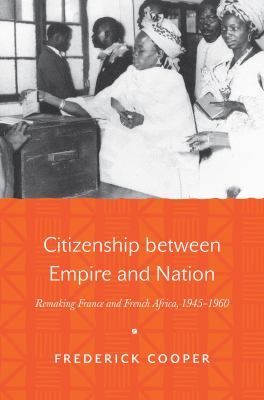
Citizenship Between Empire and Nation Remaking France and French Africa, 1945-1960
"In this archival tour de force, Frederick Cooper proposes a radically new understanding of French decolonization in Africa. Far from being determined by the irrepressible force of nationalism, this process was punctuated by attempts to invent alternatives to empire that would maintain a strong connection between France and African territories. Cooper captures the effervescence of these debates, during which French and African individuals transformed the meaning of such central notions as citizenship, empire, nation, and federation. By showing the depth of their political imagination, Cooper invites us to think about the power of ours."--Emmanuelle Saada, Columbia University "Exploring the claims of colonial subjects and metropolitan attempts to reform colonial governance, "Citizenship between Empire and Nation" traces the complexities of citizenship, the horizons of self-representation, and the uncertainties of the politics of transition during the end of an empire. Based on in-depth archival research and theoretical insights, this remarkable account is located at the intersection where the future of empire and of France is debated. It will change our understanding of nationhood, citizenship, and political imagination."--Mamadou Diouf, Columbia University "With its exhaustive research, clear and persuasive argument, and boldly original questions, this book is nothing short of magisterial. It is quite simply the best comprehensive study that I have read regarding the final stages of France's empire in Africa. There is nothing like it in depth, scope, or analytical acuity."--Alice L. Conklin, Ohio State University "This is the first book to provide a much-needed exploration of the time and space in between empire and postcolony in sub-Saharan Francophone Africa. Cooper expertly navigates between African and French perspectives, bringing to life the negotiations over the future of Africa. Timely and significant, this excellent, wide-ranging, and original book uses dazzling research to elaborate a completely new and compelling argument."--Eric Jennings, University of Toronto
Reviews
Ashley Morin@ashmm